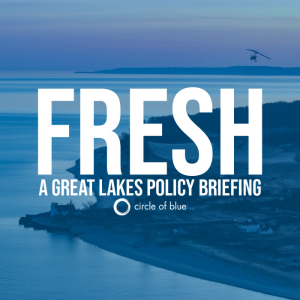Federal Water Tap, October 16: EPA Pulls Cybersecurity Plan for Water Utilities
The Rundown
- The White House suspends environmental laws to build Mexican border wall.
- The EPA abandons plan to mandate cybersecurity check-up for water utilities.
- FEMA opens applications for $1 billion in climate resilience grants.
- The GAO details state and local spending of pandemic relief funds.
- A Senate committee will hold a hearing on the Supreme Court’s wetlands ruling.
- The EPA announces research funding to study PFAS accumulation in plants and animals.
And lastly, the Biden administration announces the biggest Great Lakes Restoration Initiative cleanup project to date.
“While the memorandum is being withdrawn due to litigation, improving cybersecurity across the water sector remains one of EPA’s highest priorities.” — EPA statement emailed to Circle of Blue after the agency abandoned its plan to mandate cybersecurity assessments as part of state water utility evaluations.
By the Numbers
$1 Billion: Funding now available for a FEMA-administered program to reduce the risk of climate and weather hazards to communities. The application deadline for fiscal year 2023 Building Resilient Infrastructure and Communities grants is February 29, 2024. States, tribes, territories, and the District of Columbia are eligible. A separate $800 million grant program to reduce flood risk has the same application deadline.
45 Percent: Share of pandemic relief funds under the American Rescue Plan Act that states have spent. The act provided $350 billion for states, tribes, local governments, and territories to spend on pandemic response, including upgrades to water and sewer infrastructure. Local governments have spent 38 percent of their funds. A GAO report details the spending as of March 31, 2023.
In context: Billions Flow to Water Systems from Federal Pandemic Relief Funds
News Briefs
Cybersecurity
The EPA, after industry pushback and a lawsuit, will no longer require states to assess water utility defenses against hackers.
The agency rescinded a March 3, 2023, memo that added cybersecurity to an audit known as the sanitary survey. The memo had required states to identify lax digital practices and utilities then to correct them.
Water industry groups including the American Water Works Association and National Rural Water Association were pleased that the memo was withdrawn, arguing that the sanitary surveys were not the appropriate vehicle for regulation. They prefer a collaborative approach.
Despite the disagreement, cyber intrusions are a real security threat. Utility departments in recent years have witnessed virtual attacks on their equipment. Meanwhile, city governments in Atlanta and Baltimore found their operating systems infected with ransomware, a form of digital hostage-taking.
The EPA wrote in a statement to Circle of Blue that it recommends voluntary assessments. The agency will provide support through “risk assessments, subject matter expert consultations, and training.”
Border Wall
The Department of Homeland Security is suspending environmental laws in order to fortify the border in the Rio Grande Valley of southern Texas.
The waiver allows the department to build roads and barriers in Starr County without permits or reviews under the Clean Water Act, Migratory Bird Conservation Act, Endangered Species Act, National Environmental Policy Act, and others.
Great Lakes Restoration
The Biden administration announced the largest cleanup project to date under the Great Lakes Restoration Initiative as state and federal agencies pledged an estimated $450 million to remove contaminated sediment from the Milwaukee estuary.
Downstream of an urban, industrial area, the estuary is laden with PCBs, heavy metals, and hydrocarbons.
Studies and Reports
Natural Hazards in the Upper Missouri River Basin
The Biden administration is developing an early-warning system for droughts, floods, and other natural hazards in the Upper Missouri River.
On the Radar
Senate Wetlands and Streams Hearing
On October 18, the Senate Committee on Environment and Public Works will hold a hearing on the implications of the Supreme Court’s Sackett decision.
Issued in May, the decision limits federal regulation of waterways.
PFAS Research Funding
The EPA has $8 million for research into PFAS accumulation in plants and animals, particularly in farm settings.
The research will “reduce human PFAS exposure via the food supply and promote farm viability,” according to application documents.
There is reason for this focus. Dairy farmers in recent years have dumped milk and culled herds that were exposed to the chemicals.
The EPA expects to award five grants. Applications are due December 6.
Federal Water Tap is a weekly digest spotting trends in U.S. government water policy. To get more water news, follow Circle of Blue on Twitter and sign up for our newsletter.
Brett writes about agriculture, energy, infrastructure, and the politics and economics of water in the United States. He also writes the Federal Water Tap, Circle of Blue’s weekly digest of U.S. government water news. He is the winner of two Society of Environmental Journalists reporting awards, one of the top honors in American environmental journalism: first place for explanatory reporting for a series on septic system pollution in the United States(2016) and third place for beat reporting in a small market (2014). He received the Sierra Club’s Distinguished Service Award in 2018. Brett lives in Seattle, where he hikes the mountains and bakes pies. Contact Brett Walton







Leave a Reply
Want to join the discussion?Feel free to contribute!